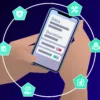I just spent three days onsite with a team that was being onboarded to our product, PortX. One of our very capable solution consultants was also there to handle the hard technical tasks and train new users by co-implementing some pilot projects.
Why was I there? Does it seem overkill to have the CTO at a new client onboarding? Not for me. I was there to see what made sense to these newbies and what didn’t. Although they had knowledge of EDI and B2B communications, they were new to our product. Experienced users can give you deep insights into how they really work and how they wish they could work. You always want to learn how to make the product more productive for experienced users.
Being able to watch a brand new user learning your product for the first time, and to hear the unfiltered responses and questions of the untrained, is pure gold to a product manager. The delight or frustration of a new user makes all the difference in their long-term impression of the product.
Unfortunately, a trend I see as product companies get large is that the product team gets separated from the customers – losing a pathway for understanding the user’s needs, the market reality, and even their own sales team.
This usually starts for good reasons, I think – the desire to improve the quality and the predictability of new releases. But it leaves a gap, a lack of connection between the people planning the product and the ones actually using it.
Of course, you do have to have boundaries, as we learn in the fable of the man, the boy, and the donkey. You must keep certain guidelines in mind:
- You can’t take every product suggestion or you’ll end up with a hodgepodge. You have to stay focused on your core user audience, and you have to make sure any new features are properly generalized to be useful to a wide range of customers, not just the current squeaky wheel
- You have to have open communication with your sales team while remaining careful – the sales team will always want to say yes and to promise the moon, which can lead to either rushed feature releases that aren’t ready for prime time or else missed roadmap dates.
But there is an even greater danger – product teams over-isolating themselves, believing their own assumptions, and failing to learn and adapt to users’ needs and the evolution of the marketplace.
These product teams don’t sit with customers. They deny and downplay features that don’t fit into their current roadmap. And they get frustrated with salespeople who try to bring product requests from new or potential customers.
This is I why I spent three days at an onboarding workshop with a new client last week. I much prefer working where I am, in an organization where that separation hasn’t developed. And I plan to keep PortX this way, even when we grow and are large enough that some level of isolation is unavoidable, I’m committed to keeping the products we work on as close to the customer’s voice as possible.






